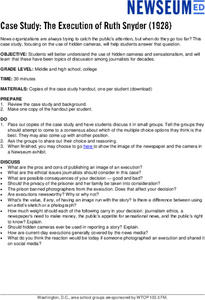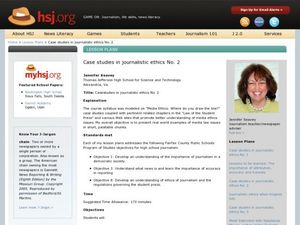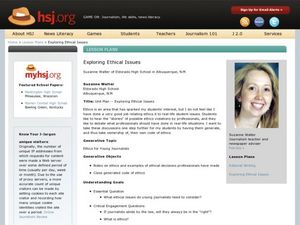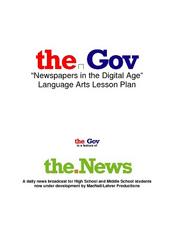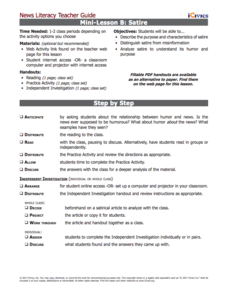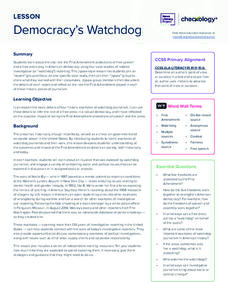Curated OER
Plagiarism in the Real World
How would you feel if someone plagiarized your work? After class members turn in an assigned newspaper article, you rewrite the piece using elements of their writing. Then you claim you will be selling the story and that you will profit...
Social Media Toolbox
Verification
When you're putting together a great story, you've got to consider the source! Scholars discover the dangers of errors in reporting during the 14th activity in a 16-part Social Media Toolbox series. Groups collaborate to create a source...
Newseum
Case Study: The Execution of Ruth Snyder (1928)
The case of the 1928 execution of Ruth Snyder takes center stage in a lesson that asks young journalists to consider the ethics involved in publishing an image of an execution. A series of discussion questions ask individuals how they...
Facing History and Ourselves
The Power of Images
One picture but a thousand stories. As a part of a case study of how the death of Michael Brown was reported by professional news sources and on social media class members examine the reactions of various groups to a photograph taken by...
iCivics
Lesson 2: Misinformation
Fake news is a hot topic right now ... but what is it? Intrepid young investigators track down the facts that separate journalistic mistakes and misinformation through reading, research, and discussion. Part three in a five-lesson series...
Newseum
You Can’t Say That: Right to Know vs. Security Risk
Print or block? That is the question young journalists debate as part of their study of the freedom of the press. Half the class represents the journalists' legal team, and the other half represents the government's legal team. Teams...
iCivics
NewsFeed Defenders
How can people learn to spot viral deception? Players do just that with the NewsFeed Defenders media literacy game. Scholars choose avatars and the focus of their news feeds: student life, health and wellness, or sports and...
Facebook
The Verification Steps
Provenance, source, date, location, and motivation. High schoolers learn how to verify the authenticity of news stories and posts by following a seven-step process. They then use the strategy to determine the original site that posted a...
Curated OER
Forming a Code of Ethics
High schoolers discuss and create a code of ethics for their student newspaper.
Curated OER
Case Studies in Journalistic Ethics No. 2
Learners use texts on media ethics and various Web sites to explore real world examples of media law issues. For this media ethics lesson, learners examine the Food Lion case using a transcript from the court of appeals session and...
Curated OER
Contraceptives and conscience
Students read The New Republic article and/or watch the News Ohio streaming video package. They employ a wide range of strategies as they write and use different writing process elements appropriately to communicate with different...
Curated OER
To Report or Not To Report?
Students examine the reasons why reporters do not report all they know about a given event. They identify basic journalist ethics at stake when a story isn't reported. They compare these issues with those in their local community.
Curated OER
Exploring Ethical Issues
Students learn about ethical issues and its connection to journalism. Students examine examples of ethical issues some journalists have faced. in small groups, students collaborate to write a code of ethics for their school newspaper....
Curated OER
Law & Ethics for Photojournalists
Students identify and discuss First Amendment rights, examine how to make sound legal judgements regarding photographs of private individuals, examine difference between public and private figures as far as libel law is concerned,...
PBS
Copyright and Fair Use
When is using someone else's copyrighted material appropriate? Learn about copyright and fair use with a lesson from PBS.org. Scholars read through a reference sheet about authors' rights and users' rights, and then create posters for a...
Curated OER
Newspapers in the Digital Age
Is journalism more or less reliable with the influx of Internet sources? Learners investigate the issues of freedom of speech, journalistic ethics, and social responsibility in the age of Twitter and Facebook. After examining the...
Curated OER
World Media: Comparison of Iraq War Accounts
Students are introduced to the concept of news/media bias from region to region. Upon reading differing articles, students answer source questions on the structure/content of each article.
Curated OER
Case studies in journalistic ethics No. 1
Students examine the importance and responsibilities of journalists through examination of illegal immigration. In this journalistic ethics instructional activity students analyze scenarios and look at the pros and cons of illegal...
West Virginia Department of Education
Editorials: The Guiding Voice of Authority?
How much can opinion influence a news story? A standalone resource discusses the importance of John Brown's Raid through the lens of journalism. Learners analyze two different texts, one from the perspective of the North and the other of...
Curated OER
Cell Phones with Cameras Banned in Locker Rooms
Students research the way phones work and what places - both locally and nationally - have already faced the problem of in appropriate use. Students also interview gym owners or managers in their community and those who use they gyms....
Curated OER
The First Amendment, What it Means and When Libel Comes in to Play
Students research three topics: The First Amendment, John Peter Zenger and his trial, and libel. In this journalism and libel lesson, students discuss things authority figures have done they disagree with and the anit-sedition law....
iCivics
Mini-Lesson B: Satire
Hey, what's so funny? Explore the use of satire in a variety of media with a hands-on instructional activity. Fourth in a five-part journalism series from iCivics, the activity introduces satirical language in print and online. Pupils...
Facebook
Metadata
In previous lessons, young journalists learned about how to trace the original source of scrapes and memes. This interactive lesson plan teaches them another important step in the verification process. Participants learn how to analyze...
News Literacy Project
Democracy’s Watchdog
As part of a study of the importance of the First Amendment, expert groups research different historic case studies of investigative reporting, and then the experts share their findings with jigsaw groups. The case studies include Nellie...




